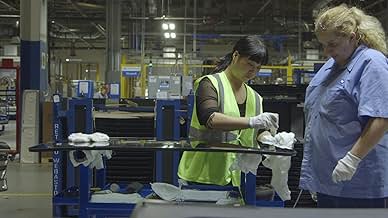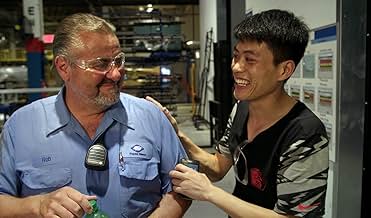CALIFICACIÓN DE IMDb
7.4/10
25 k
TU CALIFICACIÓN
Una fábrica cierra en Ohio en 2008. En 2014, un multimillonario chino la compra e invierte en producción de cristal para coches. Un retrato de las relaciones públicas entre Estados Unidos y ... Leer todoUna fábrica cierra en Ohio en 2008. En 2014, un multimillonario chino la compra e invierte en producción de cristal para coches. Un retrato de las relaciones públicas entre Estados Unidos y China.Una fábrica cierra en Ohio en 2008. En 2014, un multimillonario chino la compra e invierte en producción de cristal para coches. Un retrato de las relaciones públicas entre Estados Unidos y China.
- Ganó 1 premio Óscar
- 19 premios ganados y 50 nominaciones en total
Robert Allen
- Self - Furnace Off-Loader
- (as Bobby)
Opiniones destacadas
I can't decide whether or not "American Factory" is hilarious or deeply depressing.
Hilarious because it's funny to see the culture clash between working class Americans and their Chinese counterparts (the Chinese CEO on a tour of his newly acquired American factory wants the fire alarm relocated because.....well, because it just looks bad). But depressing because it highlights the new global reality that many Americans just will not accept -- automation is eliminating entire sectors of workers around the world, and you can debate all day whether or not this is a good thing or a bad thing, but what's not up for update is that it's happening either way and those that can't adapt will be left behind.
This movie also reinforced something I've noted before, which is that if you take opposing ideologies to their furthest extremes, you eventually will meet in the same place. Conservative America is absolutely horrified at the slightest hint of socialism, let alone outright Communism, and tout capitalism as one of America's guiding principles. But the Chinese company in this film shows that capitalism taken to its monstrous extreme results in a culture that might as well exist in a Communist dictatorship, where allegiance to the company substitutes for allegiance to a political leader. And faced with that, what do working class Americans want? A dose of socialism to protect them from runaway corporate interests.
Grade: A-
Hilarious because it's funny to see the culture clash between working class Americans and their Chinese counterparts (the Chinese CEO on a tour of his newly acquired American factory wants the fire alarm relocated because.....well, because it just looks bad). But depressing because it highlights the new global reality that many Americans just will not accept -- automation is eliminating entire sectors of workers around the world, and you can debate all day whether or not this is a good thing or a bad thing, but what's not up for update is that it's happening either way and those that can't adapt will be left behind.
This movie also reinforced something I've noted before, which is that if you take opposing ideologies to their furthest extremes, you eventually will meet in the same place. Conservative America is absolutely horrified at the slightest hint of socialism, let alone outright Communism, and tout capitalism as one of America's guiding principles. But the Chinese company in this film shows that capitalism taken to its monstrous extreme results in a culture that might as well exist in a Communist dictatorship, where allegiance to the company substitutes for allegiance to a political leader. And faced with that, what do working class Americans want? A dose of socialism to protect them from runaway corporate interests.
Grade: A-
Greetings again from the darkness. In December 2008, General Motors shut down their truck plant in Dayton, Ohio, putting approximately 2000 employees out of work. Six years later, Chairman Cao Dewang, the founder of Fuyao Glass, invested millions to turn the shell of the plant into a retro-fitted factory and the first U.S. operation for his company - a company he claims owns 70% of the auto glass market. In doing so, the factory hired approximately 1000 locals, many of whom had not had consistent work since the GM plant closed years prior.
Co-directors Steven Bognar and Julie Reichert share an Oscar nomination (she has 3 total) for their 2009 documentary short, THE LAST TRUCK: CLOSING OF A GM PLANT. This time out, they have impressive access to a remarkable situation: a successful Chinese company opening a factory in the United States, and attempting to merge two distinctly different cultures. We hear much these days about globalization, and by the end of the film, you'll likely be re-defining the word.
This unique business model came with good intentions on both sides. The differences that start out as kind of funny and well-intentioned turn into hurdles that are nearly impossible to manage. Fuyao ships many workers from China to Dayton for the training of U.S. workers. These 'temporary' transplants must spend two years away from their family as they try to make sense of an unfamiliar land far different from home. Workshops are held for the Chinese workers as they are lectured on what makes Americans different ... they don't work as hard, they don't dress well, they talk too much on the job, they won't work overtime, etc. The Chinese blatantly state that they are superior to American workers - a point that's difficult to argue against when it comes to dedication, quality, and efficiency. We soon learn there is more to the picture.
U.S. labor and safety laws exist for a reason, and the Chinese company neither understands these, nor is very willing to abide by them. Additionally, since this is the 'rust belt', the shadow of unionization hovers from day one. While China's Workers' Union functions in sync with companies, U.S. labor unions are regularly in conflict with companies here. When the U.S. supervisors make a training and observation trip to China to see the Fuyao factory, the differences become even more obvious. The mostly overweight Americans show up casual - one even in a JAWS t-shirt - while the lean and fit Chinese are all in fine suits and ties. Morning shift routines are also contrasted to point out the gaps in discipline and attention to details.
What the filmmakers do best is allow us to see both sides of the issue. Surely the right thing to do is obvious when it comes to safety, and when Chairman Cao says the real purpose in life is one's work, well, we realize these two cultures are farther apart than the 7000 miles that separate them. It's a fair look at both sides, but for those who say U.S. companies are too focused on profit, they'll likely be surprised to learn that Chinese factory workers typically get 1 or 2 days off from work each month! As one of the dismissed American managers states, you can't spell Fuyao with "fu". The film seems to present a debate with lines drawn via citizenship and culture, and the contrast might be more relevant today than ever before.
Co-directors Steven Bognar and Julie Reichert share an Oscar nomination (she has 3 total) for their 2009 documentary short, THE LAST TRUCK: CLOSING OF A GM PLANT. This time out, they have impressive access to a remarkable situation: a successful Chinese company opening a factory in the United States, and attempting to merge two distinctly different cultures. We hear much these days about globalization, and by the end of the film, you'll likely be re-defining the word.
This unique business model came with good intentions on both sides. The differences that start out as kind of funny and well-intentioned turn into hurdles that are nearly impossible to manage. Fuyao ships many workers from China to Dayton for the training of U.S. workers. These 'temporary' transplants must spend two years away from their family as they try to make sense of an unfamiliar land far different from home. Workshops are held for the Chinese workers as they are lectured on what makes Americans different ... they don't work as hard, they don't dress well, they talk too much on the job, they won't work overtime, etc. The Chinese blatantly state that they are superior to American workers - a point that's difficult to argue against when it comes to dedication, quality, and efficiency. We soon learn there is more to the picture.
U.S. labor and safety laws exist for a reason, and the Chinese company neither understands these, nor is very willing to abide by them. Additionally, since this is the 'rust belt', the shadow of unionization hovers from day one. While China's Workers' Union functions in sync with companies, U.S. labor unions are regularly in conflict with companies here. When the U.S. supervisors make a training and observation trip to China to see the Fuyao factory, the differences become even more obvious. The mostly overweight Americans show up casual - one even in a JAWS t-shirt - while the lean and fit Chinese are all in fine suits and ties. Morning shift routines are also contrasted to point out the gaps in discipline and attention to details.
What the filmmakers do best is allow us to see both sides of the issue. Surely the right thing to do is obvious when it comes to safety, and when Chairman Cao says the real purpose in life is one's work, well, we realize these two cultures are farther apart than the 7000 miles that separate them. It's a fair look at both sides, but for those who say U.S. companies are too focused on profit, they'll likely be surprised to learn that Chinese factory workers typically get 1 or 2 days off from work each month! As one of the dismissed American managers states, you can't spell Fuyao with "fu". The film seems to present a debate with lines drawn via citizenship and culture, and the contrast might be more relevant today than ever before.
To be honest I can't believe they released this film... There are more than a few aspects that seem quite surreal and unbelievable.
I think for the most of the film you will be asking yourself a question where is all of this going, the answer is out there and it is quite broad.
One of the most shocking moments is the reveal of Chinese work culture. Workers are literally robots, they have numbers, they don't waste any time, they work 16 hours a day 26 days a month non stop.
In China, the corporation you work for is glorified to the point that you start to feel like you are part of a cult rather than a company that is simply making profit.
While it might be normal for China that there are small kids dancing, weddings happening and corporate bosses praised during one of the company celebrations, personally to me this looked surreal to the point of crazy.
For me the job is just a job, it's there because you need to make money, everything else is big bosses making big bucks off your back, nothing less nothing more, for chinese it's a cult.
Now I don't know if the goal of the globalization is to make everyone work like in China, but if it is, then everyone, literally everyone is in deep trouble, especially the biosphere of our planet ...
I think for the most of the film you will be asking yourself a question where is all of this going, the answer is out there and it is quite broad.
One of the most shocking moments is the reveal of Chinese work culture. Workers are literally robots, they have numbers, they don't waste any time, they work 16 hours a day 26 days a month non stop.
In China, the corporation you work for is glorified to the point that you start to feel like you are part of a cult rather than a company that is simply making profit.
While it might be normal for China that there are small kids dancing, weddings happening and corporate bosses praised during one of the company celebrations, personally to me this looked surreal to the point of crazy.
For me the job is just a job, it's there because you need to make money, everything else is big bosses making big bucks off your back, nothing less nothing more, for chinese it's a cult.
Now I don't know if the goal of the globalization is to make everyone work like in China, but if it is, then everyone, literally everyone is in deep trouble, especially the biosphere of our planet ...
This film is an extraordinary achievement. With footage going back over the years, the directors have pieced together the saga of the establishment of a Chinese-run industrial operation in Dayton on the site of a much-lamented closed GM plant, illustrating, with total objectivity, the contradictions that ensue from the imposition of one national worldview upon another in a dynamic that it never a clash of equals. The impatience and contempt of the Chinese investors toward their U.S. workforce and the consequent cultural conflicts are highlighted to devastating effect, illustrated by what American viewers will find to be an uncomfortable dissection of their own culture, in all its fatuous self-indulgence, by amazing footage of lectures on the subject by Chinese cross-cultural consultants as they lecture Chinese workers and supervisors sent to Dayton to show Americans in how things should be done.
At the Q&A at the premiere at IFC Center, co-director Julia Reichert was at pains to stress that the film was never meant to be polemical, that this was an effort to immerse and learn. While some of the silllier aspects of both cultures, (but especially the regimented and self-congratulatory aspects of the Chinese). come through with particular acuity, you can't help buy muse on how Americans have acted with equal tin-earedness and cultural arrogance around the world, over many more decades than the Chinese have been at this game.
At the same time, America's neediness of manufacturing jobs, even if they don't pay a living wage, and the ways that so many of what we would normally consider our core values go out the window to accommodate anyone who will invest in them, come through particularly clearly. This all comes together in a fight over the establishment of a union that would protect workers' rights and uphold our eroding safety and environmental standards that is the vivid core of the movie.
A final note: This film has an extraordinarily compelling musical score by someone names Chad Cannon that propels and highlights the narrative and is amazingly effective on its own terms. Although the idiom is different, Cannon's score does for this film much of what Philip Glass's have done over the years for the films of Errol Morris, and that is high praise indeed.
At the Q&A at the premiere at IFC Center, co-director Julia Reichert was at pains to stress that the film was never meant to be polemical, that this was an effort to immerse and learn. While some of the silllier aspects of both cultures, (but especially the regimented and self-congratulatory aspects of the Chinese). come through with particular acuity, you can't help buy muse on how Americans have acted with equal tin-earedness and cultural arrogance around the world, over many more decades than the Chinese have been at this game.
At the same time, America's neediness of manufacturing jobs, even if they don't pay a living wage, and the ways that so many of what we would normally consider our core values go out the window to accommodate anyone who will invest in them, come through particularly clearly. This all comes together in a fight over the establishment of a union that would protect workers' rights and uphold our eroding safety and environmental standards that is the vivid core of the movie.
A final note: This film has an extraordinarily compelling musical score by someone names Chad Cannon that propels and highlights the narrative and is amazingly effective on its own terms. Although the idiom is different, Cannon's score does for this film much of what Philip Glass's have done over the years for the films of Errol Morris, and that is high praise indeed.
Fascinating documentary about a Chinese corporation that invests in American manufacturing, utilizing a site and workers that had been laid off by GM. We see the inevitable culture clash between Chinese management and American workers, with the shoe on the other foot relative to outsourcing, and hear frank observations about Americans from foreign eyes. In a larger sense, we get insight into the plight of blue-collar workers from both countries, and it's a depressing view.
The Chinese management team that comes in doesn't always care about safety or the environment, but they're brutally efficient and drill their workers like an army or Communist party members, the latter of which is ironic, since the workers are so far from the ideals of communism, e.g. having real power and sharing the wealth of their labor. Meanwhile, one seriously wonders whether Americans can compete in this space, having been "spoiled" by prosperity and earlier times when they made a decent salary. You know, how dare they want a good work/life balance!
Where the documentary falls short is in not showing us the treatment of these workers under the American company beforehand; it really could have used a one hour segment on that. If it had taken the time to do so, we would have seen the same problematic behavior from American corporate executives squeezing every last drop out of their workers for the sake of the bottom line, ultimately leading to outsourcing manufacturing to overseas workers forced to work long hours, often away from their families.
The only effective means of worker power is through unionizing, and both Chinese and American executives resist it mightily, using pages from the exact same playbook, like targeting leaders and paying for propaganda campaigns. In a sense, the American executives going overseas was like finding a pool of scabs to cross the picket line. As one of the state congressmen observes in speaking to the workers, corporate profitability and treating workers respectfully via a living wage are not incompatible things, and it's shameful that they're treated that way out of unfettered greed in extreme capitalism. (Hmm, if only there was an international labor organization, lol)
It seems to me it's a system that spirals upon itself further - when you distribute the wealth so incredibly unfairly in a country, the vast majority of consumers can't afford to pay the premium for a product that was made by unionized hands. They often don't have the economic freedom to do that, or to do things like shop at a mom 'n' pop shop instead of some corporate goliath like Wal-Mart, because they're living paycheck to paycheck and every penny matters. The result is to further drive the system in the direction it's going. Suddenly the middle-class starts dwindling and people are hoping more for a miracle ala the lottery than thinking they can truly make it. The documentary doesn't mention any of this so I'm guilty of rambling on here, but it did make me think.
The ending sequence is sobering as well, showing management practically salivating over robotics taking the place of workers - you know, those pesky things on the payroll that do all of that complaining, sometimes get sick or pregnant, etc. Hey, we can drive costs down by just replacing them with machines! It's too bad no one asks any of the executives the difficult moral questions, like what the right thing to do is, or how they justify their behavior. Overall though, well done, and pretty chilling stuff.
The Chinese management team that comes in doesn't always care about safety or the environment, but they're brutally efficient and drill their workers like an army or Communist party members, the latter of which is ironic, since the workers are so far from the ideals of communism, e.g. having real power and sharing the wealth of their labor. Meanwhile, one seriously wonders whether Americans can compete in this space, having been "spoiled" by prosperity and earlier times when they made a decent salary. You know, how dare they want a good work/life balance!
Where the documentary falls short is in not showing us the treatment of these workers under the American company beforehand; it really could have used a one hour segment on that. If it had taken the time to do so, we would have seen the same problematic behavior from American corporate executives squeezing every last drop out of their workers for the sake of the bottom line, ultimately leading to outsourcing manufacturing to overseas workers forced to work long hours, often away from their families.
The only effective means of worker power is through unionizing, and both Chinese and American executives resist it mightily, using pages from the exact same playbook, like targeting leaders and paying for propaganda campaigns. In a sense, the American executives going overseas was like finding a pool of scabs to cross the picket line. As one of the state congressmen observes in speaking to the workers, corporate profitability and treating workers respectfully via a living wage are not incompatible things, and it's shameful that they're treated that way out of unfettered greed in extreme capitalism. (Hmm, if only there was an international labor organization, lol)
It seems to me it's a system that spirals upon itself further - when you distribute the wealth so incredibly unfairly in a country, the vast majority of consumers can't afford to pay the premium for a product that was made by unionized hands. They often don't have the economic freedom to do that, or to do things like shop at a mom 'n' pop shop instead of some corporate goliath like Wal-Mart, because they're living paycheck to paycheck and every penny matters. The result is to further drive the system in the direction it's going. Suddenly the middle-class starts dwindling and people are hoping more for a miracle ala the lottery than thinking they can truly make it. The documentary doesn't mention any of this so I'm guilty of rambling on here, but it did make me think.
The ending sequence is sobering as well, showing management practically salivating over robotics taking the place of workers - you know, those pesky things on the payroll that do all of that complaining, sometimes get sick or pregnant, etc. Hey, we can drive costs down by just replacing them with machines! It's too bad no one asks any of the executives the difficult moral questions, like what the right thing to do is, or how they justify their behavior. Overall though, well done, and pretty chilling stuff.
¿Sabías que…?
- TriviaDirectors Steven Bognar and Julia Reichert previously worked on the short documentary The Last Truck: Closing of a GM Plant (2009). It is about how the plant was shut down by General Motors, a topic in this movie.
- Citas
Himself - Fuyao Safety Director: Everybody at every level will say that we really, really want to be safe. But safety doesn't pay the bills.
- ConexionesFeatured in The Oscars (2020)
Selecciones populares
Inicia sesión para calificar y agrega a la lista de videos para obtener recomendaciones personalizadas
- How long is American Factory?Con tecnología de Alexa
Detalles
- Fecha de lanzamiento
- País de origen
- Sitio oficial
- Idiomas
- También se conoce como
- American Factory
- Locaciones de filmación
- Productoras
- Ver más créditos de la compañía en IMDbPro
- Tiempo de ejecución1 hora 50 minutos
- Color
- Mezcla de sonido
- Relación de aspecto
- 1.78 : 1
- 1.85 : 1
Contribuir a esta página
Sugiere una edición o agrega el contenido que falta

Principales brechas de datos
What is the Japanese language plot outline for Fábrica americana (2019)?
Responda































